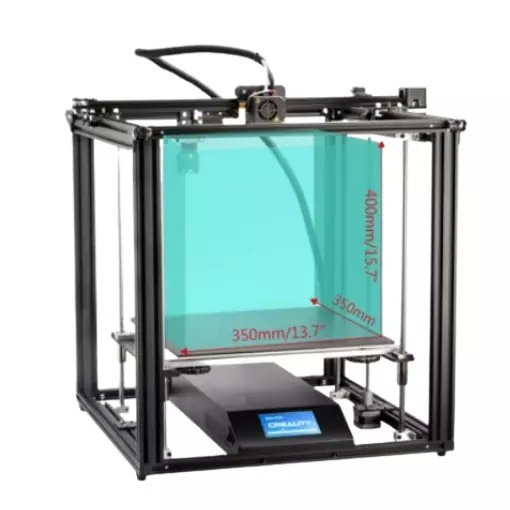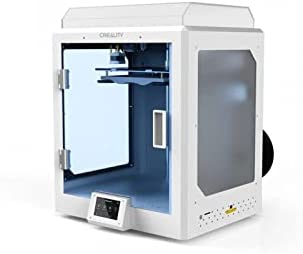Compare Ender 5 Plus vs CR5 PRO H
Comparison between the best 3D printers
Choose the best 3D printer at the best price. The cheapest 3D printers are here.
Buy a 3D printer here with 3D Fila.
 |
 |
|
| Model | Ender 5 Plus[BUY Ender 5 Plus] |
CR5 PRO H[BUY CR5 PRO H] |
| Printing Material | Filament | Filament |
| Buy Filament for Creality 3D Ender 5 Plus | Buy Filament forCreality 3D CR5 PRO H | |
| Estimated price | $599,00 | $1300,00 |
| Manufacturer | Creality 3D | Creality 3D |
| Release Year | 2019 | 2022 |
| Print Volume [mm] | 350x350x400 | 300x225x380 |
| Printer Size [mm] | 632x619x666 | 530x487x612 |
| Weight [kg] | 18,2 | 32,5 |
| Power Loss Recovery | YES | YES |
| Enclosed printer | NO | YES |
| Bed Leveling | Automatic | Automatic |
| Filament End Sensor | YES | YES |
| Bed type | Heated | Heated |
| Power supply system | Bowden | Bowden |
| Standard nozzle | 0,4 | 0,4 |
| Maximum Nozzle Temperature [°C] | 260 | 300 |
| Maximum Bed Temperature [°C] | 100 | 100 |
| Maximum printing speed [mm/s] | 180 | 100 |
| Filament holder | YES | YES |
| Camera for supervision | NO | NO |
| Recommended filaments | PLA, TPU, ABS, PETG | PLA, PETG, Tritan, Flex, ABS |
| Recommended slicers | Cura, Simplify, Slic3r | Cura, Simplify, Slic3r, IdeaMaker |
| Maximum Resolution [mm] | 0,1 | 0,1 |
| Processor | 32 bits | ATMEGA 2560 |
| Display | Touchscreen TFT 4,3'' | Display touchscreen 4,3'' |
| Power Supply | 24V / 504W | 110/220V / 350W |
| Connectivity | SD / USB | SD / USB |
| Operating systems | Windows, Mac, Linux | Windows, Mac, Linux |
| Date of registration in the system | 2021-04-14 | 2022-11-04 |
| Release date | 2019 | 2022 |
| Extra features | The Ender 5 Plus offers a large print volume (350x350x400 mm) and fast assembly. It includes a BLTouch sensor, but with range limitations. It stands out for its dimensional accuracy, although it requires adjustments to the slicer settings. Despite the noise, its integrated design saves space, and includes features such as a filament sensor and power resumption. Ideal for large projects, it requires refinement in the settings for high-quality prints. | The Creality CR-5 PRO H 3D Printer stands out with a high-temperature nozzle (up to 300°C), a 300 x 225 x 380mm print volume, and a closed chamber for thermal stability. It includes BLTouch auto-leveling, a carbon-crystal silica glass base for easy model grip and removal, a filament sensor, and a resume print function. It has a 4.3-inch touchscreen interface, quiet operation, an attractive design, and is pre-assembled, ideal for technical materials. |
| Support for multiple colors and materials (AMS and CFS) | NO | NO |
Notes * |
||
| Cost-benefit | 6 / 10 | 6 / 10 |
| Hardware | 2 / 10 | 3.5 / 10 |
| Tela | . | . |
| Print volume | 4 / 10 | 4 / 10 |
| Performance | 1 / 10 | 1 / 10 |
| [BUY Ender 5 Plus] | [BUY CR5 PRO H] |
Conclusion |
| In comparing the Creality Ender 5 Plus and the CR-5 PRO H 3D printers, several key factors come into play that can influence purchasing decisions. The Ender 5 Plus is more budget-friendly, offering a larger print volume and higher maximum printing speed. It is equipped with features like a BLTouch auto-leveling sensor and a filament end sensor, making it suitable for larger projects that may require adjustments to the slicer settings. Although it has some limitations in noise and dimensional precision, it offers good value for its price, especially for hobbyists and those looking for a reliable, large-format printer. On the other hand, the CR-5 PRO H, while significantly more expensive, provides enhanced thermal stability due to its enclosed design, making it ideal for printing with technical materials. It features a higher maximum nozzle temperature and includes a more sophisticated build with a carbon-crystal silica glass base, ensuring higher quality prints. The user-friendly touchscreen interface and quiet operation add to its appeal, particularly for professional or technical users. In summary, if budget considerations and larger print volumes are your primary concerns, the Ender 5 Plus presents an attractive option with solid performance and features tailored for accessible 3D printing. Conversely, if you require a printer that excels in material versatility and print quality, the CR-5 PRO H justifies its higher price tag through advanced capabilities and enhanced reliability for demanding projects. Ultimately, the choice will depend on specific needs, materials used, and budget constraints. |

